
36 minute read
THE LIFE
Pot in the Polls
State Question 820 is the adult-use legalization initiative that’s been gaining traction and support. But will it be on your ballot this November? TEXT MATT DINGER
Advertisement
On a June day in 2018, nearly 900,000 Oklahomans packed the polls, many coming to vote on only one item on the ballot: State Question 788, legalization of medical cannabis. Nearly 57 percent of voters approved the measure, making Oklahoma the 30th state to off er medical cannabis.
But getting adult-use— or recreational—cannabis onto the ballot has proven to be quite the fi ght, with numerous measures advancing with some degree of success but none having yet been put to a vote.
As of fall 2022, the only one of the myriad ballot initiative petitions that has made it through the signature-gathering phase is State Question 820.
“Yes On 820” is backed by New Approach, a political action committee founded in 2014 in Washington, DC with the aim of legalizing both medical
and recreational marijuana. Early attempts were made under the State Question 806 and State Question 807, with the latter making it to the signature-gathering phase in summer 2020. But the pandemic waylaid eff orts and the petition was eventually withdrawn.
“In January, we refi led the petition,” said Michelle Tilley, Yes On 820 campaign manager and the petitioner for SQ820. “The legislature has come
a long way as far as their general mood on cannabis, so we thought that it’s easier for a legalization program to come alongside the current medical program as it is moving forward, as opposed to scrapping everything to start all over again.”
By the end of August, SQ820 was headed for the fi nal step—a 10-day open challenge period—until it hit an unexpected snag. The state election board secretary announced that the measure will not be printed on the November ballot due to a purported missed deadline for printing.
The Wait Isn’t Over The problem arose because the state dragged its feet verifying voter signatures. The Yes On 820 campaign expected the count to take fi ve to seven days. Instead it took 48.
“We collected over 164,000 signatures in about 60 days.... The legislature in 2020 adopted a
new process to require a diff erent way of counting. In the past, it’s been a hand-count and this time it was done with a new software by a vendor,” Tilley said.
State statute says that petition initiative questions must be put to a vote on the next general election ballot once the process is completed, but steps ensuring that process is handled in a quick, effi cient manner are not safeguarded by the law.
“Just because we’re not meeting some arbitrary deadline should not stop the people from voting on it when we have followed the process to the hilt,” Tilley said.
If SQ820 does not make it on the ballot this November, it could take until 2024 before it gets its day at the polls. Such delays will aff ect people found in possession of cannabis products without a license.
“People have come around. They understand what marijuana is,
and it’s ridiculous for us to have laws that are so harsh and ruining people’s lives,” Tilley said.
In addition to removing criminal penalties for possessing small amounts of cannabis, SQ820 also provides expanded remedies pursuant to other criminal justice reforms that have already been passed by ballot initiative petitions and put to a vote.
“Our petition does provide for an easy expungement process for people who have had that on their record in the past. And believe it or not, there’s still people sitting in jail for this stuff —we estimate about 20,000 people—so this is a real game changer,” she said.
Learning From Our Mistakes
The major diff erence between the current medical program and recreational cannabis will be the adultuse tax rate of 15 percent. The excise tax for retail
medical marijuana sales is currently seven percent before state and local sales taxes, the combined revenue of which brought in nearly $50 million in 2019, the fi rst full year of the program. In 2020, that number jumped to more than $127 million and nearly $150 million the following year. For the fi rst seven months of 2022, more than $76 million in tax revenue has already been collected, according to the Oklahoma Medical Marijuana Authority.
—Michelle Tilley, Campaign Manager for “Yes On 820”
Tilley also said that seeing revenues from the cannabis industry has only increased its popularity across political lines. “We had signatures from all 77 counties, all the parties, all ages. I was really excited when I saw the statistics from people that had signed because it’s not a specialized group of anyone. It’s everyone,” Tilley said.
There are currently more than 383,000 licensed patients in the state—up 7,000 from the
previous year—but that’s still under 10 percent of Oklahoma residents who are allowed to patronize dispensaries.
Some fear a recreational market will wash out medical businesses and open the doors for out-ofstate operators to fl ood the industry with companies with deep pockets and eradicate the momand-pop shops. But industry attitudes are shifting.
“From what I hear from our membership, people want it done, but they want it done responsibly,” Oklahoma Cannabis Industry Association Membership Director and Administrator Kalin Bellmard said. “They want the program to not be how [SQ]788 was where we’ve had to build an airplane in the air to quote [former OCIA Executive Director] Bud Scott. They want it to be more comprehensive from the beginning, it seems. They don’t want to have to deal with constant
change, like big structural changes, happening as we move forward.”
SQ788 created a skeletal framework for the medical cannabis industry, but there was little regulation in the beginning. Most notably, there was a lack of testing and enforcement, leading to illicit operations and products moving freely across state lines, allowing bad actors to rake in enormous profi ts without oversight. At the same time, those following the law suff ered fi nancially for acting in good faith.
“Expanding the market is only going to help businesses. It just needs to be done in a manner in which we’re still providing good, clean quality products to patients and consumers. If we can minimize the impact of problems that we dealt with before, that we don’t have to deal with in the future,
I’m all for it. We just have to make sure we’re paying attention,” Bellmard said.
Not Without Its Flaws
Jed Green is the director of Oklahomans for Responsible Cannabis Action. This year, he challenged SQ820 on the basis of the single-subject rule, which means that an initiative petition must not put two distinct issues—in this case recreational cannabis and criminal justice re-
—Kalin Bellmard, Oklahoma Cannabis Industry Association Membership Director/Administrator
form—on the same ballot question. The challenge was unsuccessful. “I like what a [SQ]820 is doing with the retroactive criminal justice reform, but I believe that the legalization, the particulars of the marijuana law side are a debacle and will harm our medical marijuana program…. Fundamentally, I believe that marijuana is marijuana. The only difference between medical and recreational use is the intent of the consumer. It’s that simple. And so for that reason, while I support criminal justice reform, I don’t support the marijuana policy. We’ve seen that type of policy be very bad for other states, and I believe it will be bad here as well,” he said.
Green plans to regroup and do some fundraising before fi ling another ballot initiative petition. There is a lot of support for ORCA’s version of a state recreational cannabis program, he said.
The Takeaway
Regardless of which initiatives make it to the ballot, there is a large and growing contingent of people who have already pledged to vote for any recreational cannabis or criminal justice reform measure pertaining to marijuana possession. “If rec passes, there’s going to be growing pains like
SQ820 Ballot Title
(As of Aug. 26, 2022 as rewritten by the state attorney general’s o ce)
This measure creates a state law legalizing recreational use marijuana for persons 21 or older. Marijuana use and possession remain crimes under federal law. The export of marijuana from Oklahoma is prohibited.
The law will have a fiscal impact on the State. The Oklahoma Tax Commission will collect a 15% excise tax on recreational use sales, above applicable sales taxes. Excise tax revenues will fund implementation of the law, with any surplus revenues going to public school programs to address substance abuse and improve student retention (30%), the General Revenue Fund (30%), drug addiction treatment programs (20%), courts (10%), and local governments (10%).
The law limits certain marijuana-related conduct and establishes quantity limits, safety standards, restriction, and penalties for violations.
A local government may prohibit or restrict recreational marijuana use on the property of the local government and regulate the time, place, and manner of the operation of marijuana businesses within its boundaries. However, a local government may not limit the number of, or completely prohibit, such businesses. Persons who occupy, own, or control private property may prohibit or regulate marijuana-related conduct, except that a lease agreement may not prohibit a tenant from lawfully possessing and consuming marijuana by means other than smoking. The law does not a ect an employer’s ability to restrict employee marijuana use.
For the first two years, marijuana business licenses are available only to existing licensees in operation one year or more. The law does not a ect the rights of medical marijuana patients or licensees.
The law requires resentencing, reversing, modifying, and expunging certain prior marijuana-related judgements and sentences unless the State proves an unreasonable risk to a person. The Oklahoma Medical Marijuana Authority is authorized to administer and enforce the law.
there is with everything else, but I think that we’ve got enough experience under our belt as a state and an industry, that a lot of the problems we saw with [SQ]788, we’re not going to have those problems with [SQ]820,” Bellmard said.
“We always knew this was gonna be a battle, we always knew this was gonna be a fi ght. And I mean, we’ve built up our resources. We’ve built up our support. That’s what we’ve been doing since 2019 and we’ll keep doing it until we have legalized marijuana in Oklahoma … We’re going to have a vote on this. It is happening, I promise you,” Tilley said.

RetroBlakesberg Take a little trip, take a little trip, take a little trip with Sensi as we talk to counterculture rock photographer Jay Blakesberg about his latest visual journey.
TEXT JEN BERNSTEIN
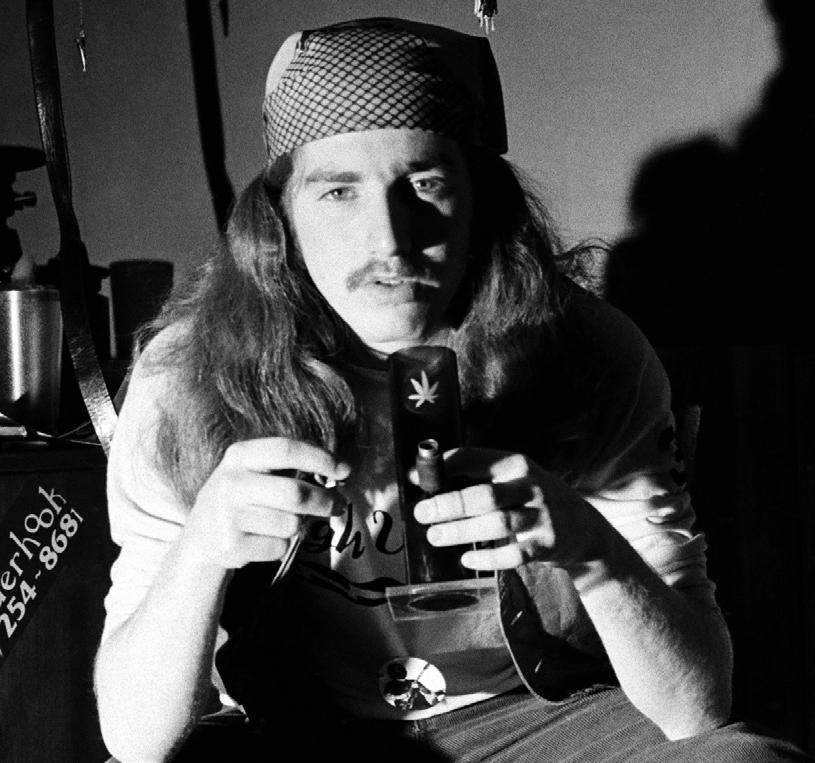
Rock and roll fans, roll up! The coolest, most introspective, mind-altering, and turned-on personal journey is fi nally claiming its right on the counterculture hall of fame bookshelf. Renowned pop culture photographer Jay Blakesberg’s autobiographical magical mystery of tales, RetroBlakesberg: Volume One: The Film Archives pulls from four deliciously decadent decades, including drug-fueled adventures in images, spanning from Blakesberg’s fi rst foray into photography as a high-school hippie in the ’70s through his switch to digital photography in 2008.
With each of the four chapters devoted to a decade and kicking off with an engaging essay and chronic-le of the time, we’re treated to an intimate look at Blakesberg’s own long, strange trip through visual eye candy of hangs with friends, rock ‘n’ roll icons of the day, and the scenesters, parties, and wild adventures that inspired and led Blakesberg to be the top-tier photographer he is today.
Dazzling images of the Grateful Dead, Rolling Stones, Nirvana, Red Hot Chili Peppers, Snoop Dogg, among many others are on display in these pages for all to ogle, along with a special foreword by Flaming Lips frontman Wayne Coyne and introduction by musician Michael Franti.
Sensi caught up with Jay Blakesberg, just as he was getting back to SF from shooting the music festival Borderland, to ask him what prompted him to turn the lens around on himself and share the intimacies of his rock star photog journey… and, obviously, what’s with all these cool memories of good times with weed?


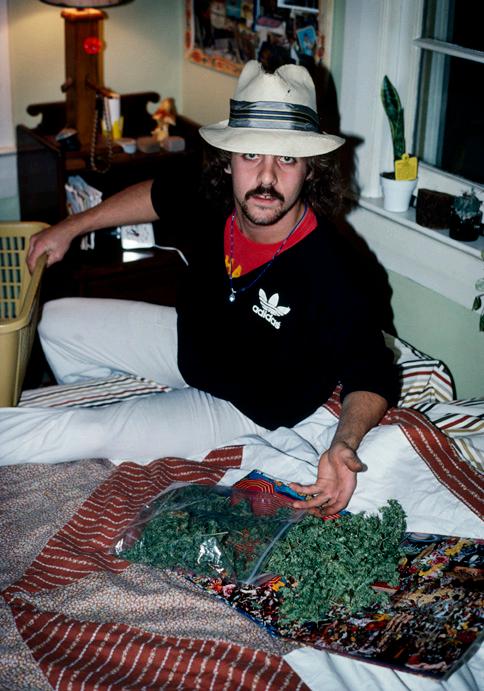
What’s it like documenting your personal journey and professional work and turning the tables for everyone to see?
I didn’t set out to chronicle my life; I just wanted to capture the cool moments I was experiencing…somehow it all intersected and I was blessed enough to make this my job, and document this weird sliver of pop culture that all us live music freaks are consumed with and now 44 years later, here we have it!
How does your relationship with weed impact you, your life, and live music photography?
Ever heard the phrase “Sex, Drugs and Rock and Roll”? Well, when we were 16 we had lots of drugs. It was mostly weed, LSD, lots of rock and roll—but no sex!
There’s photos of you with bongs, and you’ve taken shots of musicians with weed. Was it ever taboo? Now that weed is legal, do you feel diff erent about sharing these personal photos?
I embrace my youth, and the shit we did. We lived by the rule of “adolescent stupidity”: do as much dumb shit as possible, and try not to die. I think society can deal more now with seeing pictures of people smoking weed back in the 1970s then they could then…also, they weren’t really “retro” in 1982… now they are!
What do you think of where the cannabis industry is now compared to when you were growing up?
When I was a teenager in the 1970s and smoking lots of $45-anounce Colombian weed (some of it was so good you could hallucinate)… if you got caught you could do real jail time. If your parents caught you, they thought you were insane and needed to be committed, or maybe go to counseling. It was a diff erent time, but we related to the outlaws we read about in books like The Electric Kool Aid Acid Test, and on screen in Easy Rider, or Vanishing Point. We didn’t want to be Mark Zuckerberg, we wanted to be Dennis Hopper or a Merry Prankster!
What do you hope the takeaway is for younger generations who fi nd your work?
I want younger generations to look at my work and be inspired. Take that inspiration and continue the tradition of documenting the Long Strange Trip.
SENSIMAG.COM EXCLUSIVE Read Sensi’s interview with Blakesberg’s daughter, Ricki, who curated @Retroblakesberg at the beginning of the pandemic and had the vision for the RetroBlakesberg book project (plus more highlights from our interview with Jay) on our website.



Becoming Willy Wonka

Magical Brands lets you create your own edibles at home.
ne of the largest and
Omost innovative cannabis companies around not only helps you fully enjoy the benefi ts of edible cannabis, it also will make you more popular with people in your circle. Here’s the kicker: they don’t offer cannabis-based products; instead they allow you the opportunity to make craft-batch consumables from the comfort of your own home.
We are talking about Magical
Brands, the nine-year-old company that has revolutionized the world of edibles. With products available in 22 countries, it’s become a must-have for any cannabis connoisseur. With the MB2e MagicalButter Machine, you’ll agree it has never been this easy to DIY, from infused sauces to delectable desserts and everything in between. Magical is the answer for both amateur and professional culinary practitioners to quickly elevate their kitchen game.
“Magical Brands is successful because we care about the customer. We help patients live a happier and healthier life. When you call us, we answer, and it is our pleasure to serve you.”
The medicinal benefi ts of making your own edibles cannot be overstated. Using Magical’s innovative system, consumers can design edibles with dosages of THC and CBD appropriate to their needs, unlike at their local dispensaries where such things are static and controlled by the state.
On top of all that, Magical has a huge online database of cannabis recipes with easy to follow step-by-step instructions and videos. Consumers can make their own sleep aids, for example, or simply host a most memorable dinner party. Freedom is at hand.
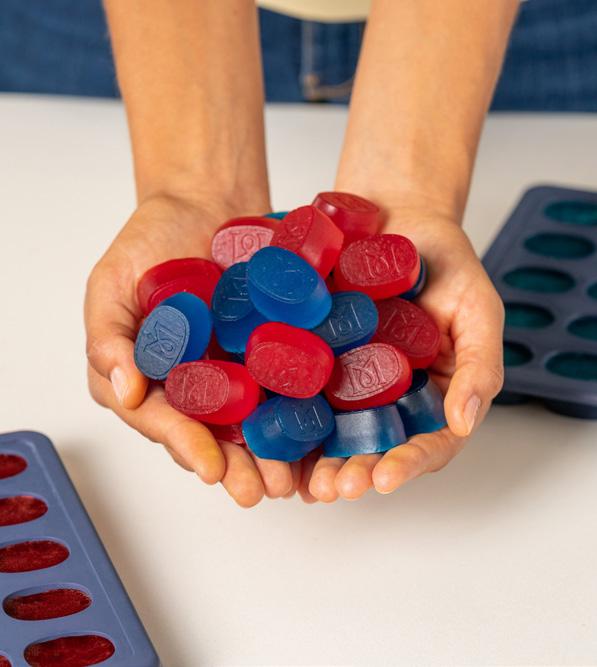
Magical Brands
Edibles made easy magicalbutter.com
Stephanie Shepard shares her story of unjusti ed incarceration, and how she now ghts for those imprisoned for crimes that are no longer criminal.

TEXT BONNIE PIPKIN
Stephanie Shepard is not a drug dealer. She is a woman who enjoys cannabis and who has a big, bright smile despite everything she’s been through. She is a collector of hats who embraces the simple and beautiful moments of life, such as a walk to the park or a ride on her skateboard, and is a champion for those still wrongly imprisoned in today’s cannabis climate.
In 2010, after a year on pretrial, she was found guilty of conspiracy to distribute 1000+ kilos of cannabis, and has since served nine years of her 10-year sentence. She is not a drug addict and, more importantly, she is not a threat to society, despite what the felon label she carries around may imply.
We sat down with Stephanie to hear her story. Her whole story. Who she is, what she lost, and how that loss became fuel for the fi re to help those still incarcerated. As she shared her experience, she had her tissue ready because Stephanie wears her heart on her sleeve and doesn’t shy from the emotion and pain. It still overtakes her. Imagine losing ten years of time with your loved ones, ten years of making memories, of having the freedom to decide what happens next for you, and of not being able to spend time with your father as he passes away. Imagine spending 10 years locked away while others are now thriving in a legal cannabis industry.
WHERE THE NIGHTMARE BEGAN
Stephanie grew up in Sacramento, California, where she currently resides, the youngest of seven children. In 2005, she moved to Williamsburg, Brooklyn—happy, hopeful, and looking forward to her future. None of her siblings had ventured away from home, but she loved the energy of New York City and so she left the nest with all the dreams in her heart. Following in her father’s footsteps, she got her real estate license, and then of course, met a guy. That guy sold cannabis. Stephanie didn’t think much about it, as it was just cannabis. Her fi rst time smoking had been at age 28, when she sought to manage her anxiety. It helped.
There are moments in life that make you wonder how things could have been diff erent. The whatif moments where your life path splits. Stephanie’s path split at age 40; her now-ex-boyfriend had been arrested, and she agreed to be his medical-leave guardian while he awaited sentencing. Before that, she wasn’t on anyone’s radar. A judge even told her she was a responsible person with a good place for him to be released.
On the day she was getting ready to pick him up, there was a buzz at her door, and her nightmare began.

LIFE WITHOUT AN “AFTER”
Nothing about her arrest felt real. So much so, that while she spent a year on pretrial, she begged her siblings to keep it secret. She could not bear to tell her parents. There was no way she was going to be found guilty of any crime. That year was the hardest on her. There was a lot of shame and guilt to carry. She lost her real estate license with the pending felony and suddenly found herself trapped in New York, unable to go home where she would have had support.
On the way to her own sentencing, when her sister asked if she wanted to stop for something to eat, her response was they would get something after. There was always an “after” in her mind.
But the jury found her guilty, and ten years was the mandatory minimum sentence. She fi nally had to tell her 91-year-old father, and his response was, “Stephy, I don’t have ten years.”
Stephanie was found guilty of distributing cannabis illegally. She had just wanted others to benefi t from the medicine that was helping with her anxiety and making her life better in general. There was never any conspiracy. But that didn’t matter now; she was a prisoner.
THE FREEDOM ULTIMATUM
Disbelief in her situation lasted for fi ve years. Halfway through her sentence she woke up, looked around, and realized this was her reality. It was time to prepare for the rest of her life.
Stephanie is driven by helping others. While inside, not wanting to do anything to benefi t the prison system, she chose to teach ESL classes to other inmates. Her goal was to help them be better when they were able to return to society. Her fellow inmates were her family. She empathized with other women incarcerated for cannabis off enses.
Funny thing though: she never

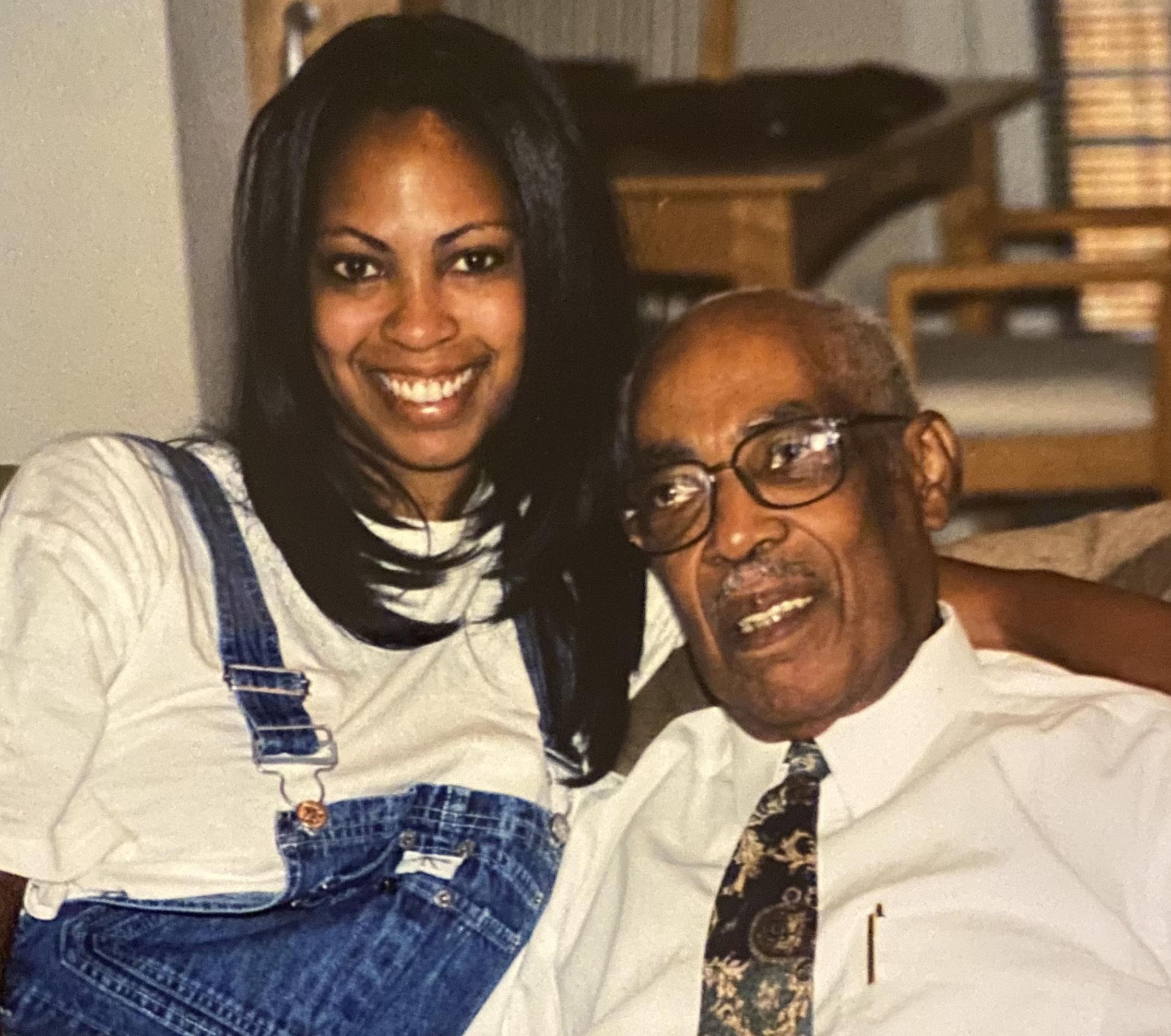
met a white woman who was incarcerated for cannabis. Only Black and Brown women. Was this a war on drugs? Or a war on people? How could this be, and how could she help? This stuck with her, and a new commitment was born.
Stephanie was off ered an opportunity to shave one year off of her sentence. The catch? She had to admit she was a drug addict and enter a rehab program. She resisted. There was no reason to attach the drug addict label to herself and create even more hardships for the rest of her life. But Stephanie’s father got sick and that would make the decision for her. She desperately wanted to see him before he was gone.
Her father was a 40-minute fl ight away, but the powers that be dragged their feet in granting permission for her to see him one last time. By the time they fi nally approved the trip, it was too late; he passed away later that day.
She did make it out for the funeral, but what she wanted was more time to explain, to share her love for him, to hold him one last time. It’s something that’s so easy to take for granted: time and freedom to choose how you spend it.
CHANGE FOR THE BETTER AT ITS WORST
Stephanie was released. Her sister gave her a safe space to re-enter life. But wait, what is this? A billboard on their way home advertising for cannabis deliveries? How could this be when she had just been in prison for nine years? When she was going to be a felon for the rest of her life! She had to ask if that was real. Her sister said, “Oh yes, there are dispensaries all around town now and delivery services that bring it right to your door!” This wasn’t so-called back alley dealing anymore. And certainly, no one in those shops were being labeled drug dealers.
Armed with her newfound commitment to help those incarcerated for a crime that has yielded a thriving industry in so many states, Stephanie Shepard attended Last Prisoner Project’s (LPP) fi rst fundraiser in San Francisco in 2019 wearing her ankle monitor. It was the fi rst real social event she experienced after her release, and she wanted to hear what they had to say. This was an important event in the trajectory of Stephanie’s life. It was there she met people who would welcome her into this community.
UNTIL EVERYONE IS OUT
LPP is a nonprofi t organization dedicated to cannabis criminal justice reform. Stephanie is now their Partnership Manager and was very recently appointed to their Board of Directors. “There’s nothing else I can do in my life right now other than what I’m doing. People incarcerated for cannabis off enses are feeling helpless and hopeless. I’m here to use my voice to uplift them and do right by them because they deserve it. They don’t deserve to be incarcerated for cannabis. BE THE CHANGE
Stephanie is ghting hard for the underserved. She never stops working. So, how can we help? The easiest way is visiting the LPP website and clicking the “Take Action” tab. It has a portal to accept donations, as well as links to petitions to sign and politicians to call. Just spreading the message on social media is a big help.
BREAK THE CHAIN
The Last Prisoner Project was founded in 2019 out of the belief that no one should remain incarcerated for cannabis o enses. We are a team of advocates, experts, leaders, and justice-impacted individuals who are deeply committed to freeing every last prisoner of the unjust war on drugs. POLICY: We impact legislation that redresses the harms caused by cannabis prohibition. We work with stakeholders across the country to pass and implement bills that will (1) provide release for individuals still incarcerated for cannabis, and (2) automatically clear cannabis records. LEGAL:We focus on clemency initiatives at the state and federal level, ling motions for compassionate release, and record relief for individuals. This all made possible through our partnership with the National Association of Criminal Defense Lawyers (NACDL). REENTRY: We ensure our constituents have the tools and resources they need to rebuild their lives after incarceration and create pathways to employment within the legal cannabis industry. ADVOCACY: We raise public awareness of the harsh reality of cannabis-related incarceration through a variety of advocacy campaigns, including letter-writing drives, constituent storytelling, and direct actions; and empower our supporters to join the ght to secure the full freedom of the communities we serve.
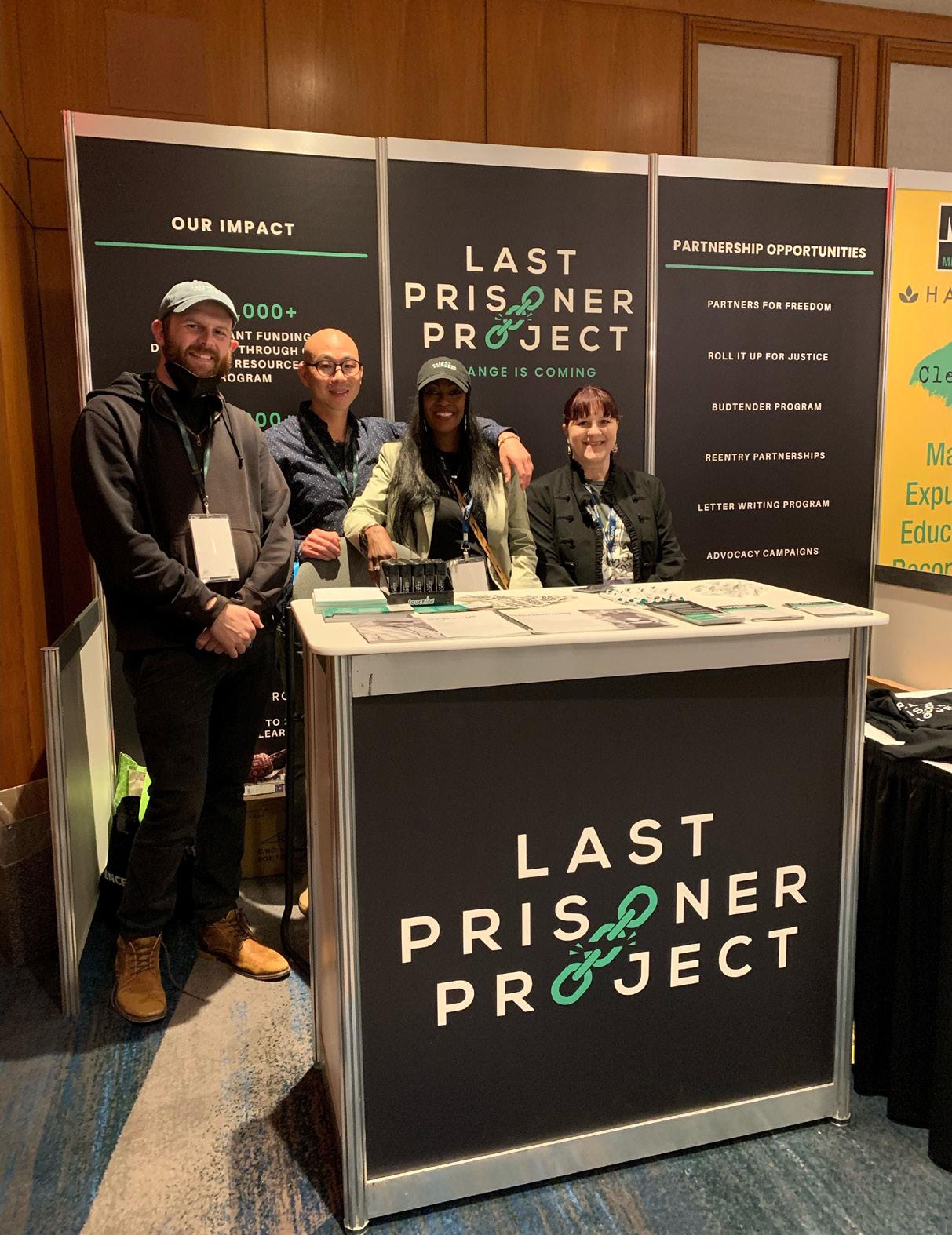
There are other things I could do to benefi t myself more, but that’s not what it’s about right now. It’s not about ego.”
As Partnerships Manager, Stephanie works tirelessly for the constituents. She knows exactly how they feel sitting inside while the cannabis industry makes billions of dollars. Every dollar made is off the backs of those incarcerated. Stephanie feels this so deeply, she wishes that she could just trade places with some of the young people who are in prison. She says she would give her life so young people such as Kevin Allen, who has life in prison for selling $20 worth of weed to a friend, could be free.
Stephanie implores everyone in the industry to just do something, whether that’s their “Roll It Up For Justice” program, where people can round up their purchases at checkout with a donation, or more boots-on-the-ground efforts. Whatever it takes to prevent anyone else from losing another day, minute or second.
Stephanie lost nine years. She lost her job, her freedom, her last chance to tell her father she loves him. But she did not lose her spirit, no matter how hard the system tried to break her. Her greater calling is now to help people in the same position. There is no stopping until everyone is out. Legalization is not enough. What’s needed is retroactive justice. With the label of felon, there are many things in society that she no longer has access to. But her voice is loud. We have heard it now and hope you have as well.
How we care for each other is the most important thing. “I want to be the voice in the room for them. I’m the emotional crying, possibly screaming, voice. The collateral consequences are too large.” Stephanie knows who she is. She is more than a felon. Nothing imposed upon her is going to put out the fi re inside her.
ABOUT THE AUTHOR Bonnie Pipkin is an author and freelance writer located in Northern California.
SPREADING THE
Carter Creek on saying the Lord’s name and bringing it all into the light.
TEXT ADDISON HERRON-WHEELER PHOTOS JEFF HOOTEN
any folks in
Mthe modern world automatically bristle at the mention of God, Jesus, or really any higher power. Whether it’s an issue with how some churches hold space for marginalized folks, or just trauma around getting dragged to church every Sunday, it is a sore spot for many.
Slim, beloved founder of seed, clone, and fl ower farm Carter Creek in Oklahoma, aims to change that. Through using his platform to gently preach to the stoned masses, not about how you’re going to hell or need to do better, but about how you are loved—he aims to bring God into the grow room in the most positive way possible.
And we don’t just jump right in and start with God. We ease our way in. After all, Slim is still a businessman, and there are some very exciting new things happening with Carter Creek. In addition to buying clones from the farm, you can also buy seeds for your grow. And, just like on Noah’s Ark, Slim knows that diversity is key when it comes to a good grow.
“One of the biggest things we have going on right now is our seed bank, and I’m working with three diff erent breeders on it right now,” Slim says proudly. “I’ve been in this game about three and a half years now, and genetics are a weakness for a lot of farms. That’s why it’s so important for me to be hooked up with the quality that I need. These days, you can’t just have OG Kush. Everyone has OG Kush. You need new fl avor, new tastes. Every week, there’s something diff erent.”
And Slim isn’t just providing cannabis to local medical patients who come to the farm’s shop to get their medicine, though that is important. So important, in fact, that Slim often gives patients cannabis at wholesale price to make sure they have access to their medication. But to be able to aff ord to do that, and to keep his farm diverse and thriving, he needs to be competitive when it comes to the clones and seeds he sells, and that’s where the new seed bank strategy comes in.
“One thing I like about the folk I’m working with is that they also collab with a multitude of other breeders,” Slim adds, highlighting the importance of diversity in the modern cannabis game, as well as the importance of reaching out and
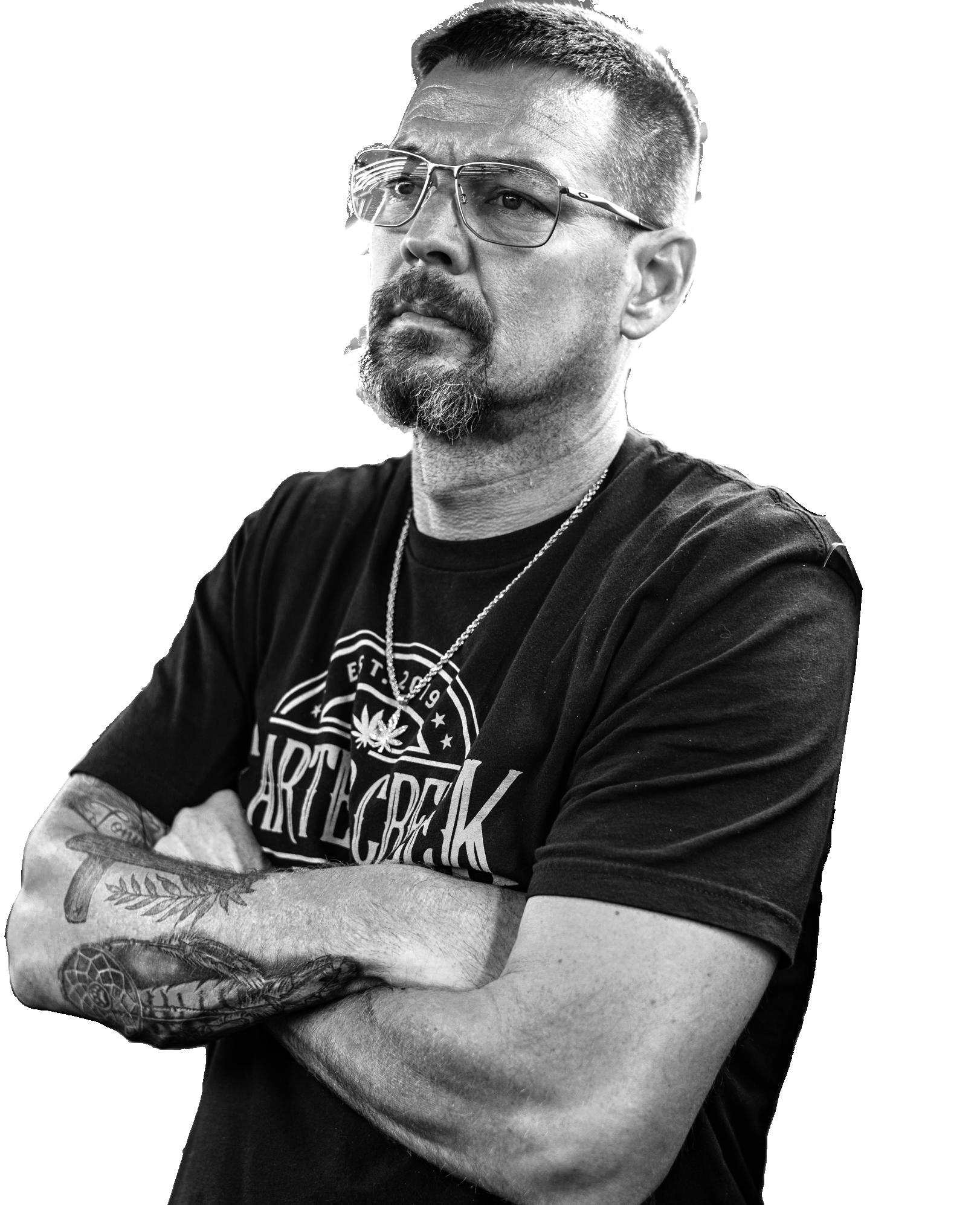
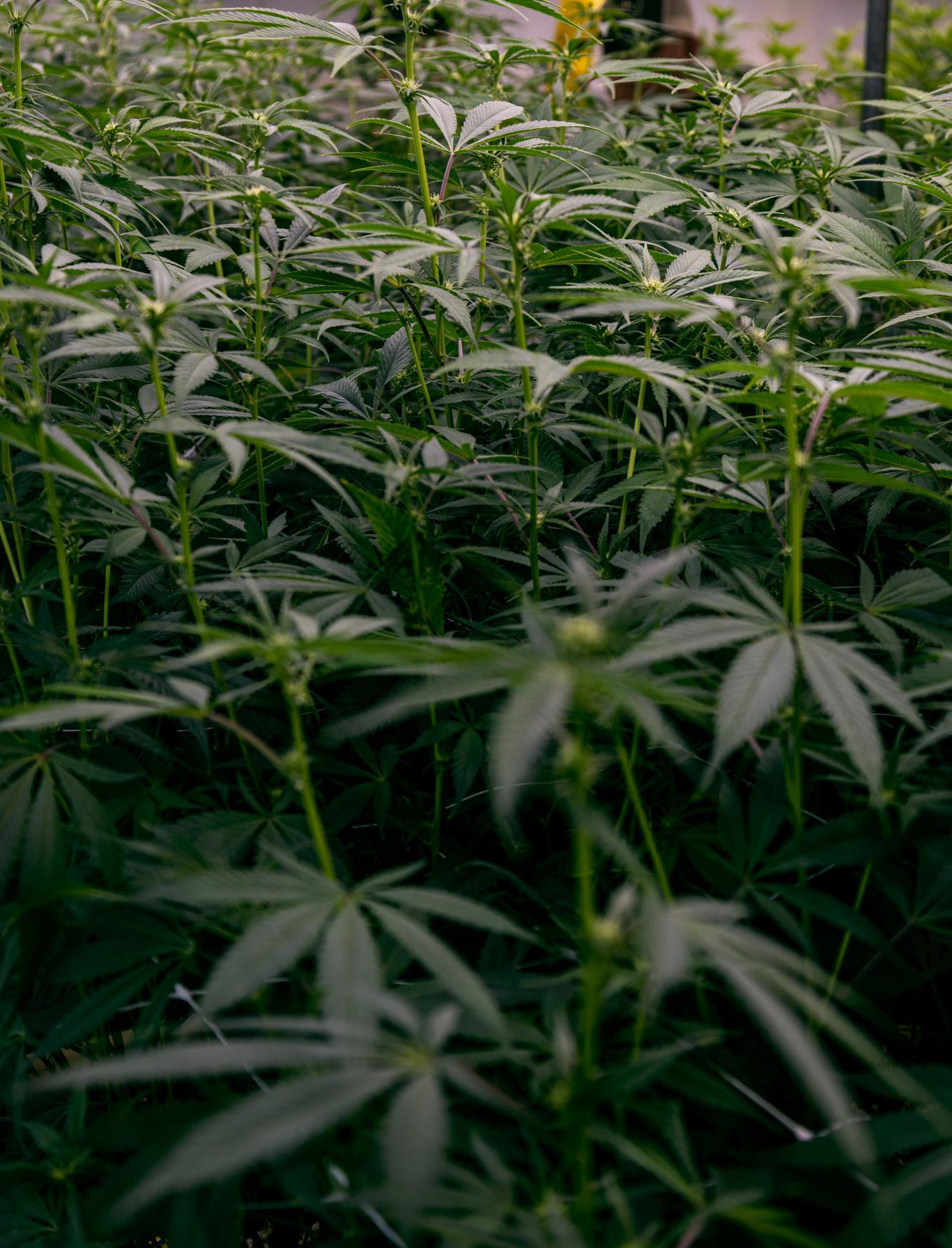

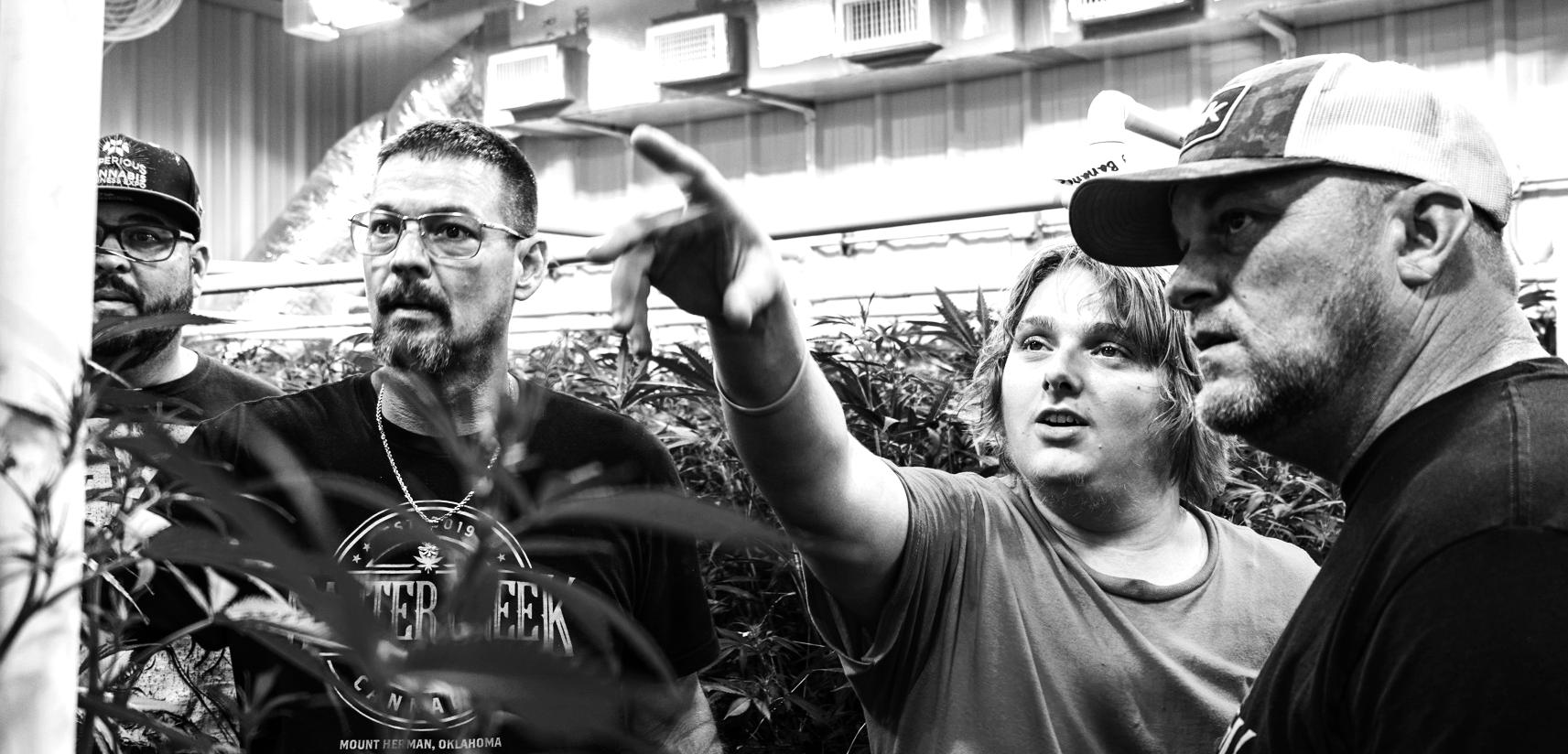
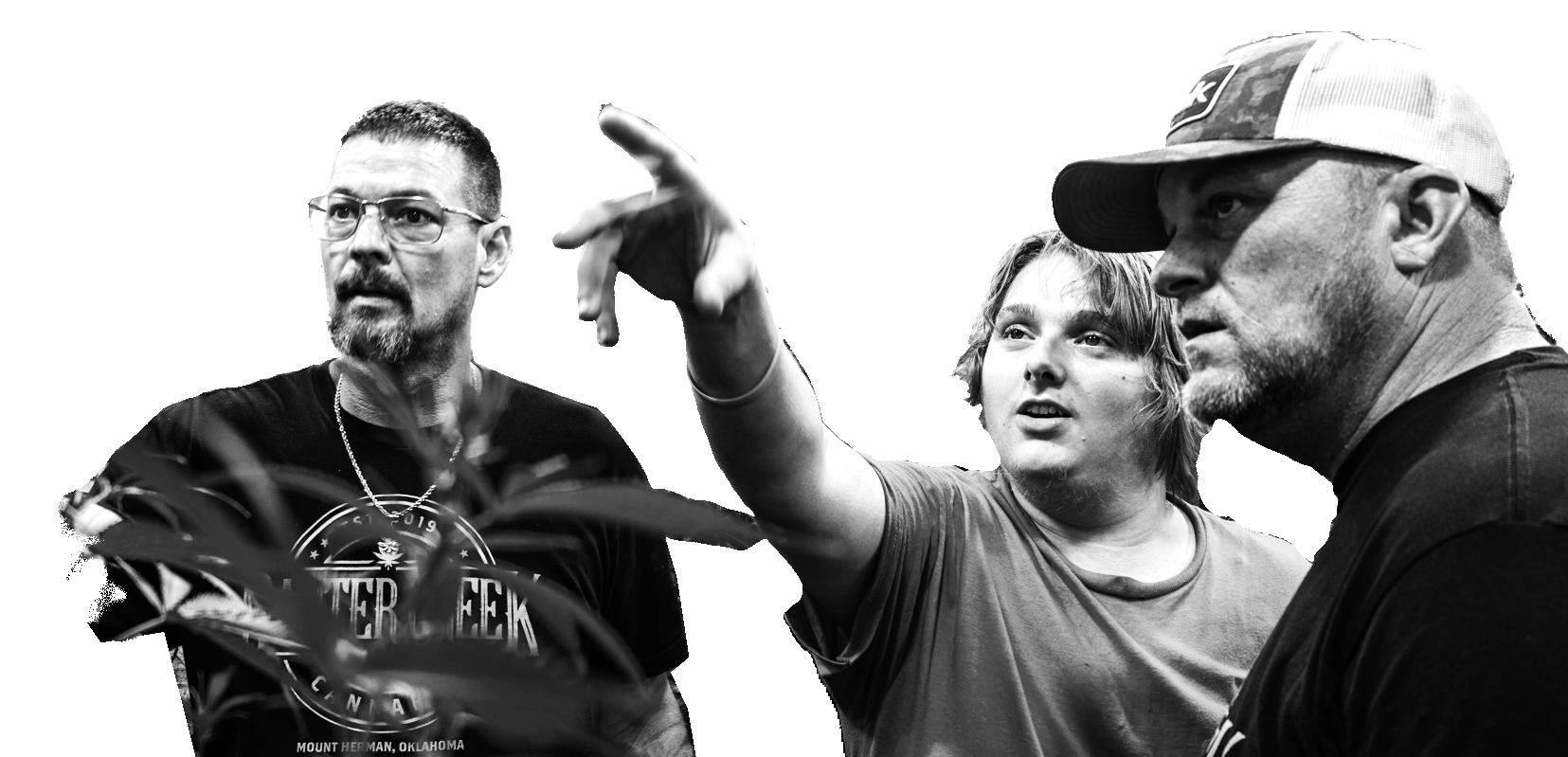
working with other major players in the local and national industry. “They come up with some of the most exotic and boutique stuff . And everything we have that comes from our team compound comes sealed, with a label verifying the authenticity of the breeder, the certifi cate of origin, all that good stuff .”
And as he is furthering his goal of getting high-quality cannabis seeds and clones into the hands of growers and breeders, and high-quality cannabis into the hands of medical patients, he is also focusing on the other thing that is most important to him besides cannabis: spreading the word of God. He does so on social media through various messaging mediums, including #growerstipoftheday on Instagram, which is usually something that can improve one’s grow and the garden they cultivate in their mind and heart. Slim claims that God spoke to him and told him to do this in order to speak to those the church has left behind.
“It’s not just the cannabis community; it’s all kinds of communities; the homosexual community has been shunned by the churches. There’s all kinds of God’s children in this world that have been condemned by religious people. We’ve been made to feel bad and told, ‘You can’t go to church here.’ But God said come as you are, not as you hope to be.”
Slim believes that cannabis, and God, are for everyone, not just for those who can aff ord the best buds and live a conservative life free of “sin.” He wants everyone to have access to his seeds and his crops, his medicine, as well as his teachings, because he knows what it’s like to be in a dark place.
“I’ve been through ups and downs,” he continues. “But I love cannabis, and in Genesis, God said he gave us all the plants; he didn’t say some plants. I should be a statistic of opioid addiction, but now, I use cannabis instead. I’ve been in that addiction spiral, and now, I don’t take any opioids. So there are a lot of people who have been kind of pushed back by the church, and I’m not trying to scare them by screaming Jesus loves them; I just want to cast a few things here and there to let them know they are loved, and they can go to whatever church they want, or just talk about God. They don’t have to go to some big building and dress up; they can just talk and listen.

—Slim, founder of Carter Creek
Any time you are talking about the word of God, that’s church.”
When it comes to being called to share his faith, Slim admits that there is also a little more to it, a desire to be open that stems from living so long in the darkness. As someone who has struggled with mental health and addiction, Slim knows that sometimes, even folks who are not religious just need to hear some positive messaging. And recently, he realized he was still keeping secrets and engaging in addict behavior by hiding his cigarette smoking habit from his wife. When he was found out, he further refl ected on what he could do to step into the light and out of the shadows.
“God told me that one of my gifts is speaking, and He told me straight up, I’m in a group and community where nobody gets to hear His name. And one of the ways I could do that, I realized, and tie it in with the work I do, was #growerstipoftheday. So I started that morning that God spoke to me back in July. I can’t speak to what it’s done for anybody else, but I can say what it’s done for me. It makes me stay conscious of what I’m doing, so that I don’t tell people the wrong thing or act wrong. And it makes me stay in bounds because I’m trying to love God and speak about Him.”
At the end of the day, for Slim, all the grower outreach, seed distribution, and spreading of the Good Word come back to one thing: the energy and love that you put in, both as a grower and as a human in this world.
“I tell everybody, all of my growers that I interview, the most important thing about growing cannabis is the energy you bring to the plant,” Slim concludes. “If you’re going to bring ugly or bad energy, there’s no sense in being a grower. Your energy will come directly to your plants, so it’s important to bring love to your plants. If you work in cannabis, you shouldn’t just come for the paycheck. You should come because you love the plant and the benefi t of what it can do for somebody else. A lot of people are looking for self-medication in this world, and a lot of that comes from mental illness, disability, all kinds of things. The very best thing is, cannabis can be used as that medicine, and for a lot of people, it really can make a diff erence.”
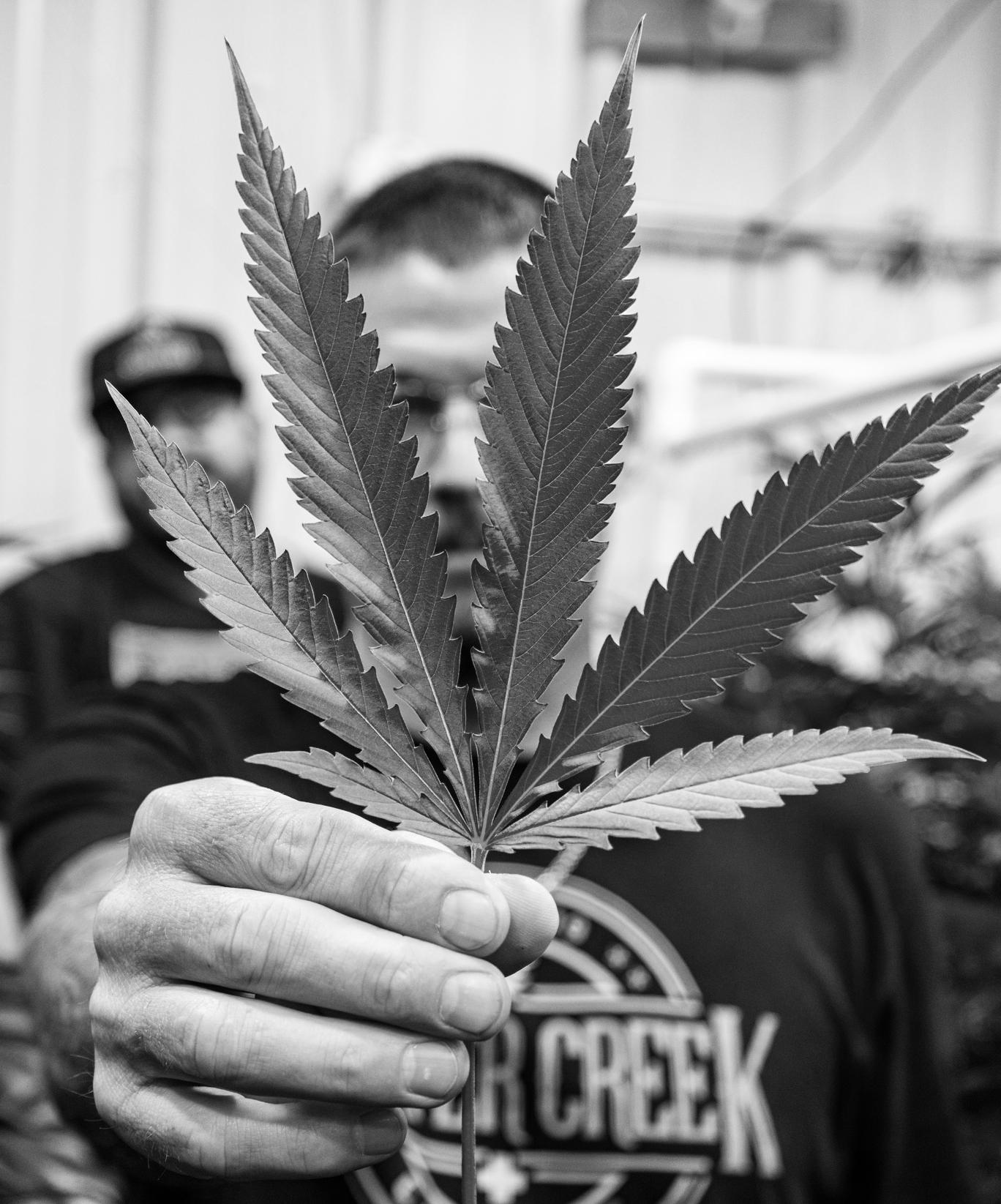

DEALING WISDOM BY THE ‘GRAM
Follow us on Instagram or search the hashtag #growerstipoftheday for a daily dose of Carter Creek inspiration.
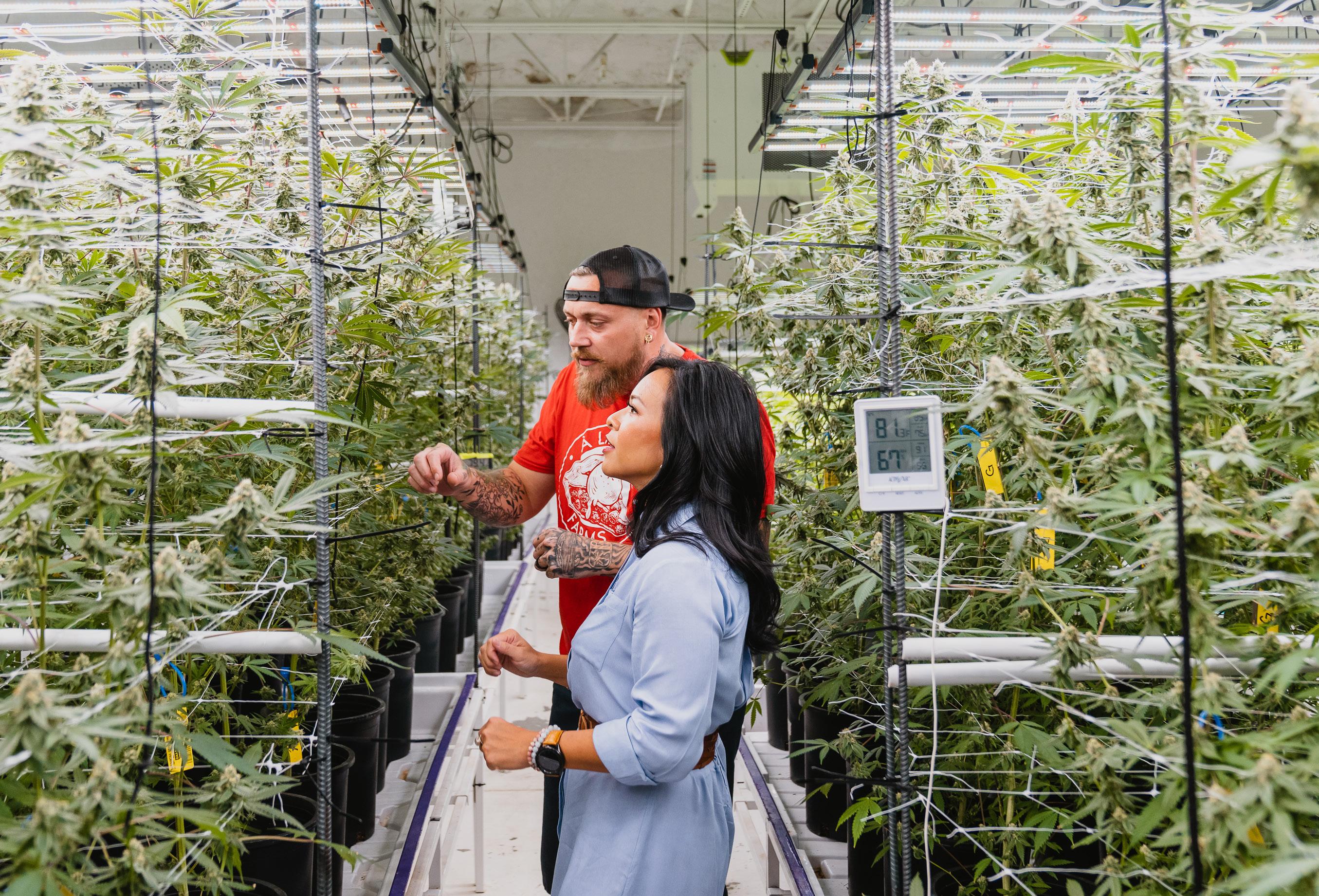
Let’s Grow Your Green
Deborah Lin and Blue Sky Bank are Putting in the Hard Work for Cannabis Banking Access.
t’s almost a cliche to write in
Ithis lede that cannabis banking is a tough industry, because if you are any more than an extremely casual reader and consumer, you know it all too well. Since cannabis is still a Schedule I controlled substance and federally illegal, it is often next to impossible for cannabis businesses, especially the plant touching ones, to get access to the banking services they need. Blue Sky Bank is working to change that.
Not at all new to the fi nancial industry, Blue Sky Bank, established in 1905, has always focused on community banking— They work to solve small business needs instead of just focusing on the major players. And now, cannabis is a part of that. And that’s not an industry secret— They have a clear, easily discoverable landing page where they announce in bold lettering “Blue Sky Bank Serves
Cannabis Business Customers.” They go on to detail that commercial deposit and banking services are now available to Oklahoma cannabis business owners, and even offer an “In The Weeds” blog showcasing testimonials from cannabis business customers.
“We truly are a partner in banking,” explains Assistant Vice President and CRB Banking Lead Deborah Lin. “Cannabis business owners already have a sense of negativity when it comes to banking as many have had their accounts closed or pay excessive fees in order to bank,” says Lin. “Customers are often relieved after speaking with me as I’m able to provide a full education as to why we are able to support cannabis
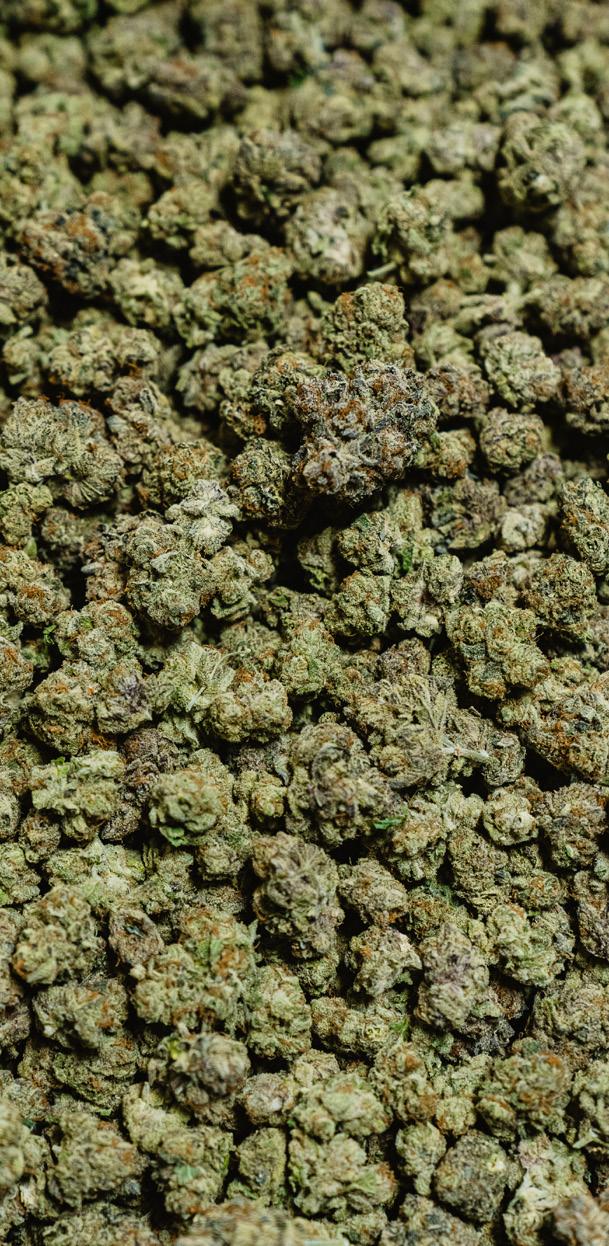
businesses and the requirements set forth by our federal regulators.”
Having an understanding and educated partner in banking is huge for the customer. Instead of dreading a monthly bill outlining charges and being billed for services, you have the benefi ts of someone who truly understands the complexities of the regulations, your business’ best interests, and a true compliance partner. “I believe when you have open communication and educate the community about our program, they gain peace of mind and a clearer understanding of why we charge the fees we do.”
And the cannabis industry—not just in Oklahoma but nationally—has been largely treated like an unwanted afterthought. The narrative has been very much, “Yes, it’s technically legal in your state, but your resources, especially banking, is limited.” Blue Sky is working to make sure that is no longer the case.
Lin explains the suite of products offered to cannabis business owners is intentional and thoughtfully provides: ACH electronic payment services, mobile deposit, pin-debit merchant services, debit cards and checks, and earnings credits. There’s also the convenience of online banking and mobile business banking. Keeping safety and security top of mind for their customers and staff, Blue Sky also provides a private deposit drop off location as well as armed cash transport services. Providing safe and effi cient deposit methods along with alternative options to operating solely in cash is more inviting and purposeful. Blue Sky Bank always has the customers’ best interest in mind asking, “How can we help give these business owners their time back?”
“You truly have a partner (in us) helping you stay as compliant as possible, and you get all the business functionality of any other business,” Lin continues. “Cannabis business owners pay almost three times the amount of tax as anybody else. So why don’t they get banking opportunities and products? Why should they have to be moving everything solely in cash when they know it’s diffi cult to trace and incurs additional costs. It’s labor intensive; it’s bulky, and it’s unsafe. And so for us, this is something that our community business owners were asking for, saying, ‘I already have all my other business and personal accounts with you; will you take my cannabis deposits too?’ And the short answer is, ‘Yes, we can.’”
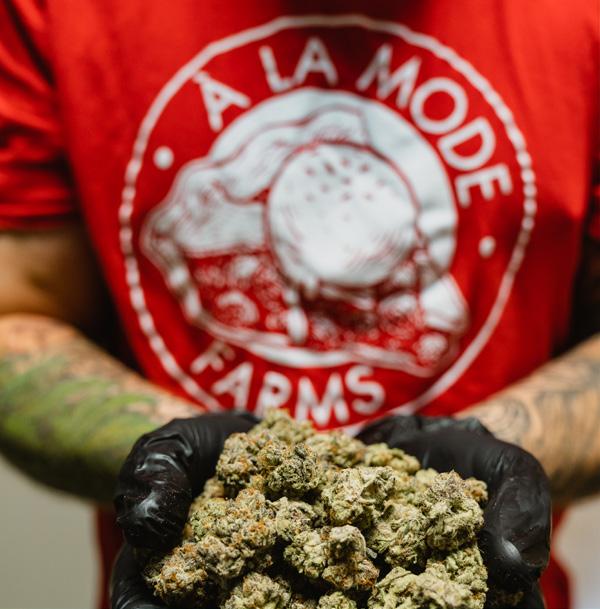
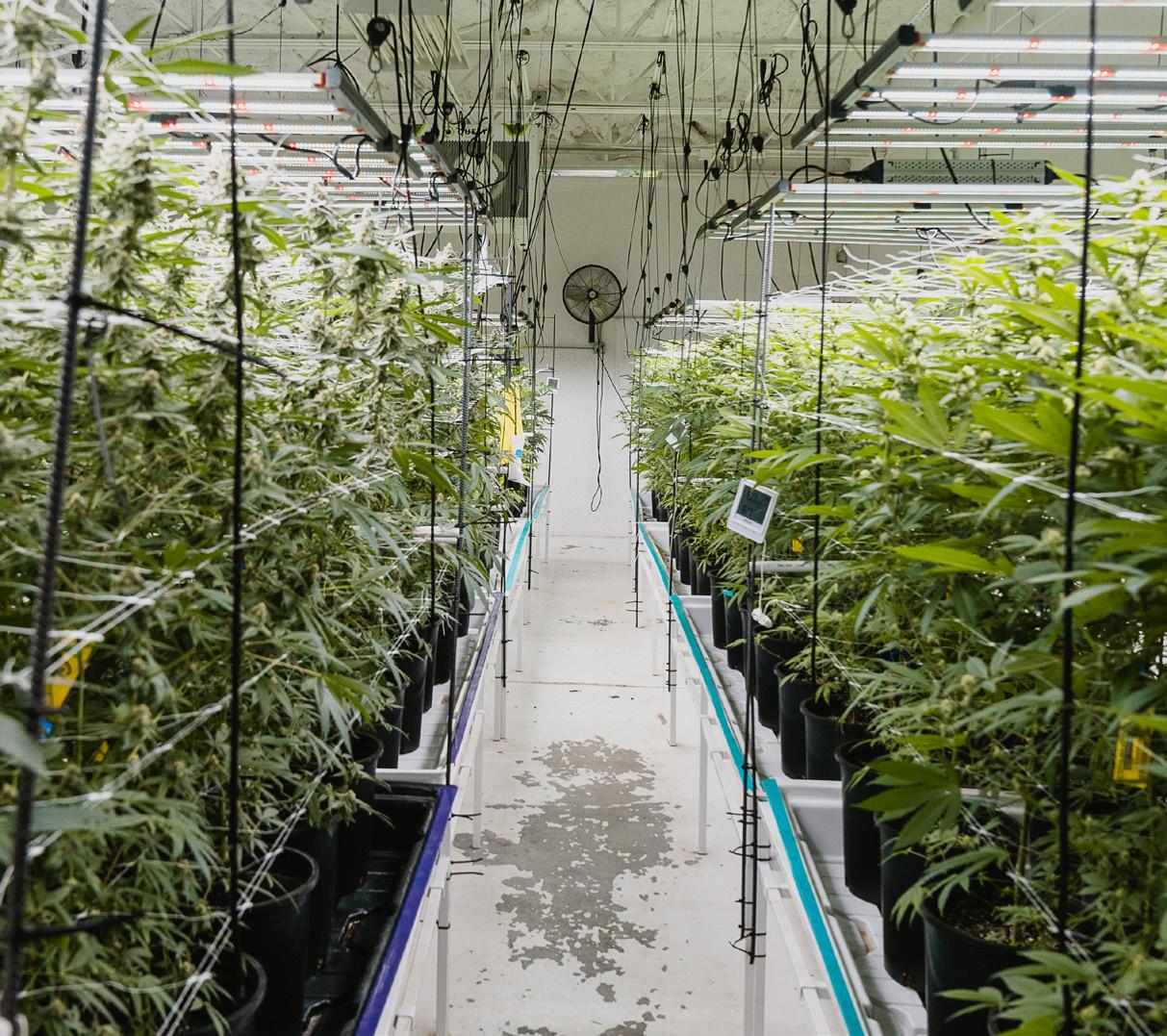
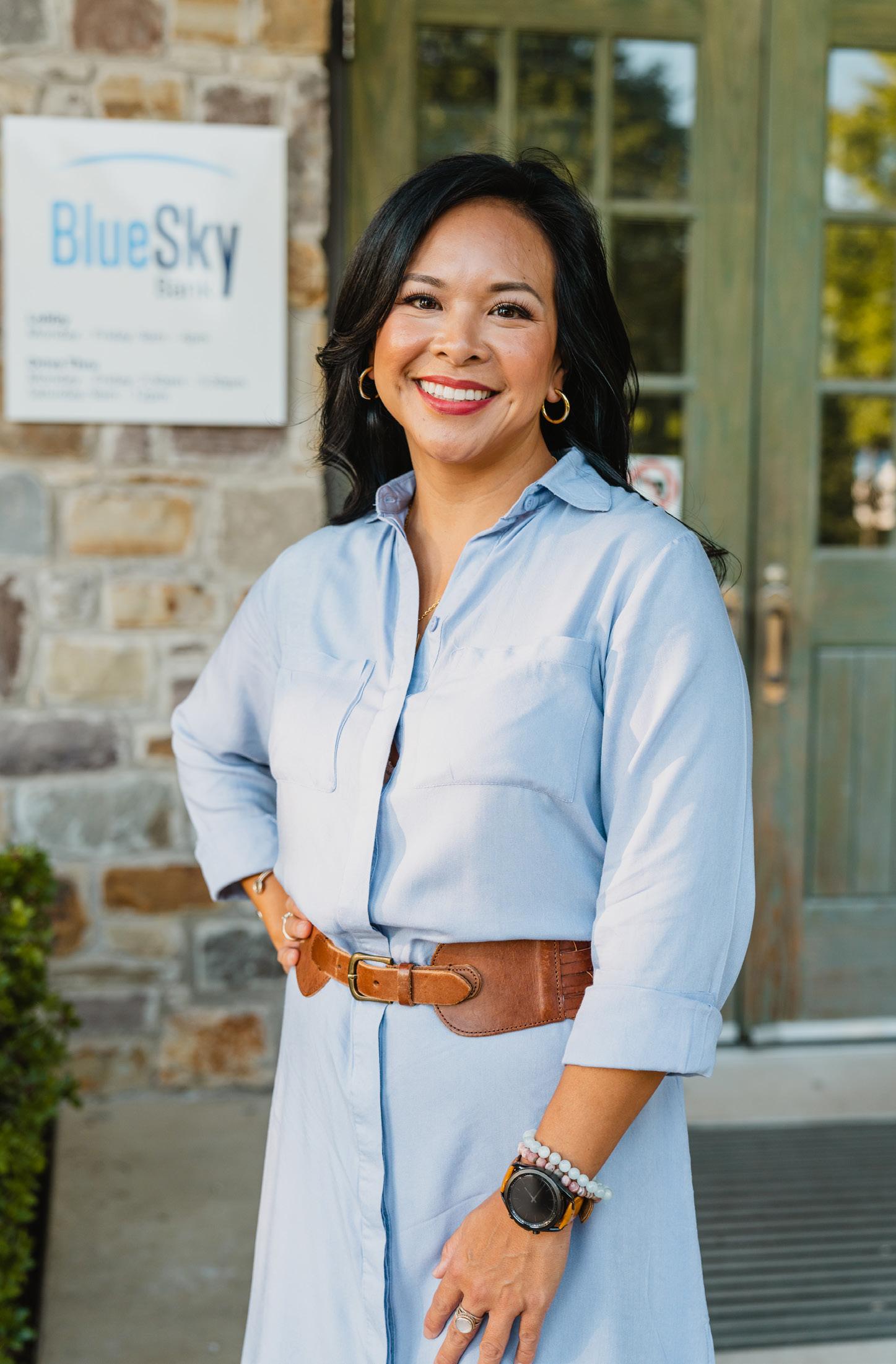
—Deborah Lin, Assistant Vice
President and Cannabis-Related
Banking Lead of Blue Sky Bank
Lin also highlights that even with the rapid growth of the cannabis industry over the past four years in the state, fi nancial institutions are still leery of providing deposit services to cannabis businesses due to lack of understanding the cannabis industry and the impact on the fi nancial institution.
“I’m an advocate for cannabis education and decriminalization. It’s important for our state and our country to have awareness of the medicinal benefi ts of cannabis and know they have alternatives to pharmaceutical drugs,” says Lin.
And on that note, Lin has her sights set even further than just on how to help local business owners in the cannabis realm. She would love to see banking become better for the industry in general as the country moves towards legalization and is working with other fi nancial institutions in Oklahoma and nationwide sharing best practices and creating standards for cannabis banking.
“We look to other states with successful programs and have open communications with their commissioners and regulators so we are current of the movements in this industry. Ideally, we hope that this network of like minded cannabis friendly banks will be able to have a seat at the table when federal legalization fi nally comes,” says Lin. “This way the programs that we have helped create can be carried out at the federal level and more ease of banking and cashless transactions are available to cannabis business owners.”
Blue Sky Bank
Cannabis Banking bluesky.bank/cannabis-banking


